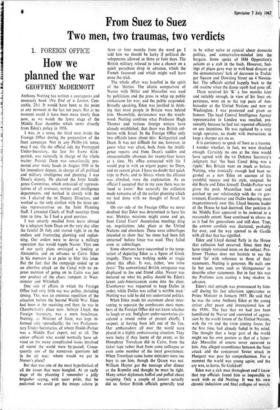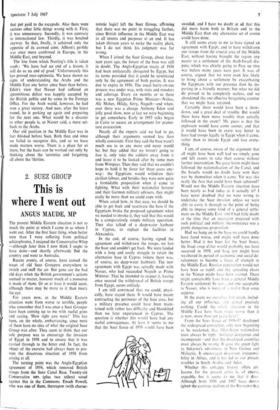How we planned the war From Suez to Suez Two
men, two traumas, two verdicts
1. FOREIGN OFFICE
GEOFFREY Men ERMOTT Anthony Nutting has written a courageous and necessary book (No End of a Lesson, Con- stable, 25s). It would have been to the point at any moment in the last ten years. But at no moment could it have been more timely than now, as we watch the latest stage of the Middle East shambles which stems directly from Eden's policy in 1956.
I was, in a sense, the third man inside the Foreign Office during the preparation of the Suez campaign. Not in any Philby-ish sense, may I say. On the official side the Permanent Under-Secretary, the late Sir Ivone Kirk- patrick, was naturally in charge of the whole matter. Patrick Dean was sensationally pro- moted over many heads in August 1956 to be his immediate deputy, in charge of all political and military intelligence and planning. I was Dean's deputy. He chaired the Joint Intelli- gence Committee, which consisted of represen- tatives of all overseas, service and intelligence departments, and worked in closely with the CIA. I chaired the nu Deputy Directors, and worked as the only civilian with the three ser- vice representatives on the Joint Planning Staff. I attended Chiefs of Staff meetings from time to time. So I had a good purview.
I was smartly recalled from leave abroad by a telegram from Dean on the very day after the fateful 26 July and started right in on the endless and frustrating planning and replan- ning. Our orders were to devise a military operation that would topple Nasser. Thus one of our early plans envisaged a landing at Alexandria and an advance to Cairo. Eden in his memoirs is at pains to blur this issue. But the fact that the campaign ended up as an abortive attack on the Canal with no ex- press mention of going on to Cairo was just one product of the chaos rampant in West- minster and Whitehall.
One side of affairs in which the Foreign Office had very little say was policy, including timing. This was an ominous repetition of the situation before the Second World War. Eden had been at the receiving end then; he was in Chamberlain's place now. Selwyn Lloyd, the Foreign Secretary, was a mere henchman. Nutting, as Minister of State, was kept in- formed only sporadically; the two Parliamen- tary Under-Secretaries, of whom Dodds-Parker was a Middle East expert, not at aL The senior officials who would normally have ad- vised on the many complicated issues involved all round the world were by-passed. Conse- quently one of the numerous questions left in the air was: whom would we put in Nasser's place?
But that was one of the most hypothetical of all the issues that were bungled. At an early stage of the planning I remember a jolly brigadier saying, with quiet pride, that he treckoned we could get the troops ashore in three or four months from the word go. I told him we should be lucky if political de- velopments allowed us three or four days. The British military refused to take a chance on a quick parachute drop in advance, which the French favoured and which might well have done the trick.
The whole affair was handled in the spirit of the 'thirties. The idiotic comparison of Nasser with Hitler and Mussolini was used by politicians and the press to whip up public enthusiasm for war; and the public responded. Broadly speaking, Eden was justified in think- ing that most people in Britain were behind him. Meanwhile, deviousness was the watch- word. Nutting confirms what Professor Hugh Thomas and various foreign writers have already established, that there was British col- lusion with Israel. In the Foreign Office only two officials knew about this: Kirkpatrick and Dean. It was not difficult for me, however, to guess what was afoot, both from the intelli- gence reports and from Dean's sudden and unaccountable absences for twenty-four hours at a time. My office connected with his. I would pop in with an urgent paper; no Dean, and no reason given. I have no doubt that quick trips to Paris, and to Sevres where the alliance was clinched, were the explanation. As an official I accepted that in my case there was no 'need to know.' But naturally the collusion made nonsense of all the earlier planning which we had done with no thought of Israel in mind.
On our side of the Foreign Office we never doubted that Eden was determined to have his war. Menzies missions might come and go, Suez Canal Users' Association meetings drag on, negotiations take place at the United Nations and elsewhere. These were subterfuges intended to show that `no stone had been left unturned' before force was used. They failed even as subterfuges.
Some observers have succumbed to the temp- tation of depicting Eden as a figure of Greek tragedy. There was nothing noble or tragic about this affair. It was, rather, 'tale triste farce.' The conventional British arrogance was displayed to foe and friend alike. Nasser was lectured on what his policy should be. Eden's latent anti-Americanism came into the clear. Eisenhower was requested to keep Dulles in order, while Dulles was called 'a terrible man.' Nutting was told he did not understand politics.
When Eden made his statement about inter- vening to separate the combatants most mem- bers of the Foreign Office did not know whether to laugh or cry. Indignant under-secretaries cir- culated a round robin of protest chiefly, I suspect, at having been left out of the fun. Our ambassadors all over the world were placed in a highly embarrassing situation. They were lucky if they learnt of the event, as Sir Humphrey Trevelyan did in Cairo, from the ticker tape rather than from some colleague or even some member of the local government. When Trevelyan came home ministers were too busy to see him, though the Queen was not. William Hayter got the message after dinner at the Kremlin and thought he must be tight. Many senior diplomats huffed and puffed about resigning. Only a couple of juniors actually did so. Senior British officials generally tend to be either naive or cynical about domestic .politics, and conservative-minded into the bargain. Some spoke of HM Opposition's actions as a stab in the back. However, feel- ings of pique gave way to well-bred distaste at the demonstrators' lack of decorum in Trafal- gar Square and Downing Street on 4 Novem- ber. The officials settled happily back to the old routine when the damp squib had gone off.
Dean received his 'K' a few months later and suitably enough, in view of his Suez ex- periences, went on to the top posts of Am- bassador at the United Nations and now at Washington. I was promoted and given an honour. The head Central Intelligence Agency representative in London was recalled, pre- sumably because he had not reported efficiently on our intentions. He was replaced by a very tough operator, no doubt with instructions to keep a sharper eye on us.
It is customary to speak of Suez as a trauma. I wonder whether, in fact, we were shocked enough. Certainly no one at the time would have agreed with the us Defence Secretary's judgment that 'the Suez Canal thing was a ripple.' But Britain went on much as before. Nutting, who ironically enough had been re- garded as a new Eden on account of his youthful success and his style, resigned. So did Boyle and Eden himself. Dodds-Parker was given the push. Macmillan took over and patched up our relationship with the us gov- ernment, Eisenhower and Dulles behaving most magnanimously over this. Lloyd became leader of the House he had deceived. Our position in the Middle East appeared to be restored to a reasonable extent. Suez continued to obsess us as it had for generations and still does. True, the entente cordiale was shattered, probably for ever, and the way opened to de Gaulle with all that that has signified.
Eden and Lloyd denied flatly in the House that collusion had occurred. Since then they have simply remained mum on the subject. Pro- fessor Thomas does not hesitate to use the word 'lie' with reference to three of their statements. Nutting is generous. He nails one lie but uses terms such as 'disingenuous' to describe other statements. But in fact this was the Profumo case casting a long shadow in advance.
Eden's real epitaph was pronounced by him- self during his last television appearance as Prime Minister in January 1957. He said that he was the same Anthony Eden as the young striver after peace and international law of the 1930s. The fact that we had just been humiliated by Nasser and convicted of aggres- sion by the world forum of the United Nations, with the us and the USSR joining forces for the first time, had already faded in his mind. The thought that a large part of the world might see his own posture as that of a latter- day Mussolini of course never occurred to him. Any alleged resemblance between the Suez attack and the concurrent Soviet attack in Hungary was past his comprehension. For a moment the world was young again; and the cry was, to horse, Sir Galahad!
Eden was a sick man throughout and I know that top officials found him as impossible to work with as did Nutting. It was his own chronic indecision and final collapse of morale
that put paid to the escapade. Also there were various other little things wrong with it. First, it was unnecessary. Secondly, it was contrary to international law. Thirdly, it was botched anyway. So that, finally, it achieved only the opposite of its avowed aims. Albion's perfidy was once more confirmed in Europe, in the Middle East, and beyond.
The line from which Nutting's title is taken reads: 'We have had no end of a lesson, it will do us no end of good.' Unfortunately this has proved over-optimistic. We have shown no signs of understanding the Arabs and the Middle East any better since Suez than before. Eden's view that Nasser had suffered an ignominious defeat was happily accepted by the British public and by some in the Foreign Office. For the Arab world, however, he had won a great victory. And now, after the latest round, he is perking up again and preparing for the next one. What would be a disaster to other people is, as Nasser said, a mere set- back to the Arabs.
Our old position in the Middle East was in fact finished before Suez. Both then and since we failed to recognise this, and so we have made matters worse. There is a place for us there, but the basis can be worked out only by thinking about the 'seventies and forgetting all about the 'thirties.







































 Previous page
Previous page